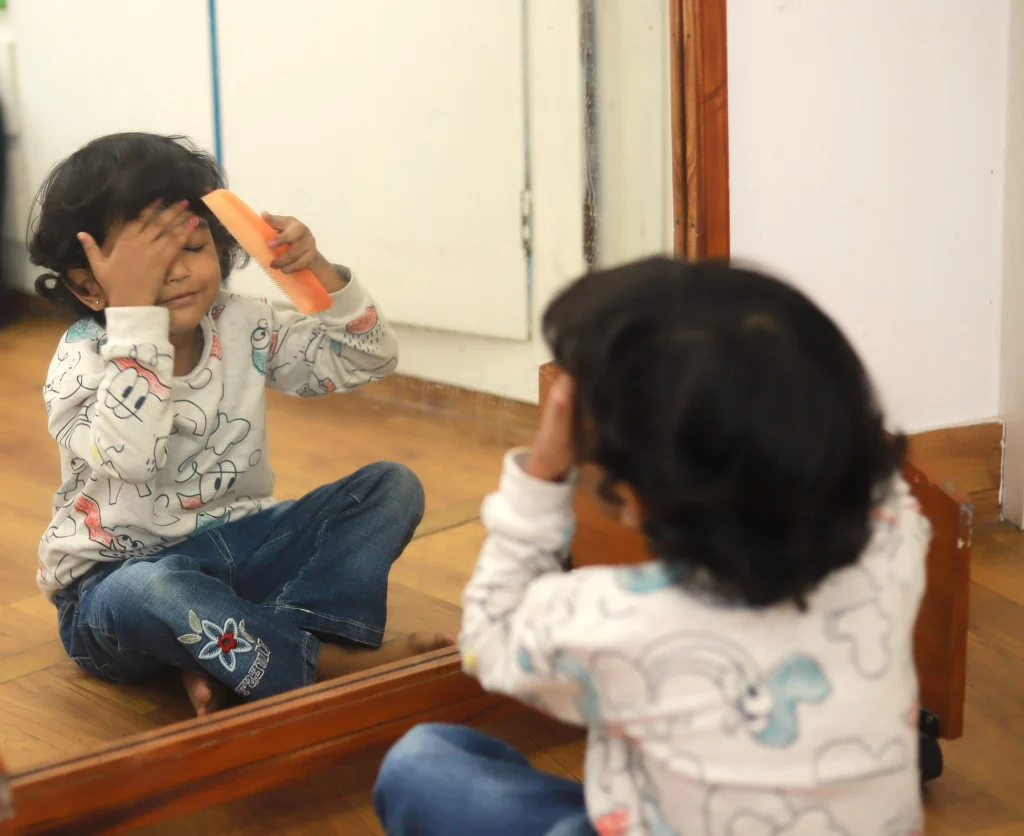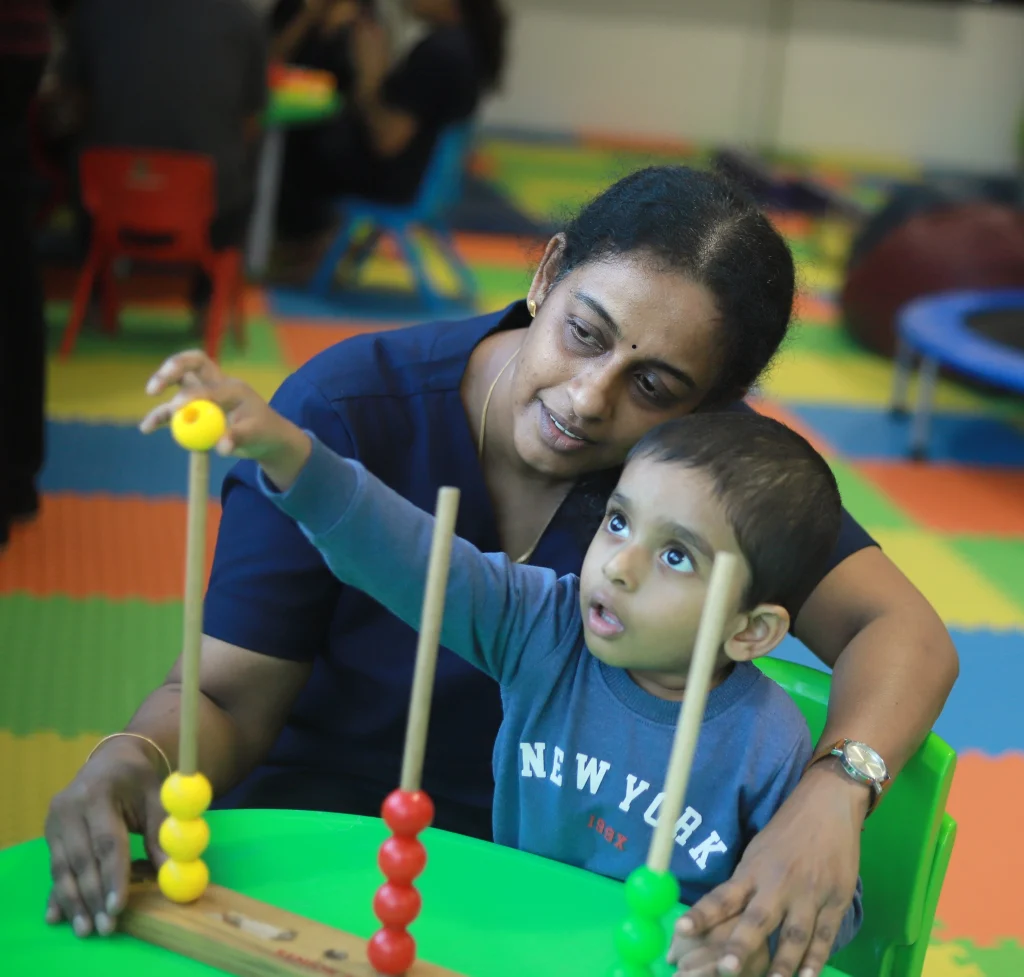Clinically Reviewed By
Dr. Lisha P Balan
Clinical Psychologist
“When early intervention is delayed, it takes four times as long to intervene in Fourth Grade as it does in late Kindergarten because of brain development, and because of the increase in content for students to learn as they grow older” – National Institute of Child Health and Human Development (US)
What is Early Intervention?
Early intervention refers to identifying the issues and concerns of a child at a very early stage, between 0-5 years, and providing therapy programs and services to meet the developmental needs of the child in a timely needful manner.
Preschool years are considered as vital years when learning and development is at its peak. Some children due to conditions noticed at birth or developmental delays noticed during the early period, miss some important learning and developmental milestones. In early intervention, necessary support and therapies are provided to these children and their families as soon as developmental concerns or delays are identified

What to Expect in Early Intervention?
Screening & Evaluation: In early intervention, experts do the evaluation to identify the developmental delays or disabilities. This involves assessments, observations, inputs from parents, caregivers, and health professionals involved with the child. Evaluation by a multidisciplinary team aims at identifying developmental delays or any physical condition that will lead to delay in development.
Individualized Intervention Program: After evaluation, a team of multidisciplinary professionals work with the family to develop an individualized intervention plan. This plan outlines the child’s strengths and needs as well as the family’s goals and priorities. Short term and long term goals are set in coordination with the parents and a treatment plan is designed to achieve desired milestones.
Services Involved in Early Intervention: Early intervention services can vary widely depending on the child’s needs and family’s preferences. Services may include, speech therapy, occupational therapy, physiotherapy, special education services, behavior therapy, ABA, parent education and training.
The individualized intervention plan so designed can be either home-based or centre-based intervention. The child’s progress will be monitored and reviewed regularly. Early intervention can assist the young children catch up in their development and paves the foundation that can help improve their life ahead.
Suggested Reading: Common Learning Disabilities in Children
Why is Early Intervention Important?

Age 0–6 years are considered the most crucial period. Because about 80% of the brain development happens during the first five years of life and effects of enrichment and deprivation during this period is long lasting. This is the period when a child exhibits different abilities for the first time, be it physical or emotional, like making sounds, smiling, grasping, rolling over, crawling, walking etc. These are referred to as developmental milestones.
Some children miss their milestones due to some birth condition or other reasons. Early identification and effective support helps in improving the child’s development before it gets too delayed or worse. Early intervention also helps in empowering the family with resources required to aid the child achieve these developmental milestones. A child’s experiences during this period have a direct impact on his brain development which makes it important to have lots of positive learning and emotional experiences.
Suggested Video: Parent Stories on Early Intervention
When to Seek Help?
If a child shows problems or difficulties in any one or more of the following areas, it is imperative for the parent to seek help for clinical evaluation and diagnosis:
- Difficulties in sucking, biting, chewing and licking
- Disability or difficulty in daily dressing, feeding and toilet tasks
- Delayed speech or language skills
- Difficulty in pronouncing certain speech sounds
- Difficulty in the child’s movement based on the perception of visual information
- Difficulties in the movement of small muscles in hands and fingers like manoeuvring tiny objects, balancing etc.
- Difficulty in writing
- Difficulty in the movement of large muscles in arms and legs
- Disability or difficulty to follow directions or answering questions
- Difficulty to plan, implement and sequence tasks involving hands and legs.
Clinical evaluation and assessment by a qualified and certified professional can help identify the problem areas that need attention and require medical and/or therapeutic intervention.

What Can Early Intervention Achieve?
Early intervention methods often emphasize supporting four key aspects of child development:
- Physical development – Focus is on the child’s physical health, brain development, motor(fine and gross motor) development and physical disability, if any, and how to cope. This forms the basis for positive development in all other areas.
- Fine motor development – This refers to the child’s ability to use small muscles, specifically their hands and fingers, to pick up small objects, hold a spoon, turn pages in a book, or use a crayon to draw.
- Gross motor development – This refers to the child’s ability to use large muscles. For example, a six-month-old baby learns to sit with support, a 12-month-old baby learns to stand holding onto furniture, and a five-year-old learns to skip.
- Cognitive development – Focus is on the speech and language skills, reading and writing, problem solving and math. Positive cognitive development is directly linked to their success at school and work life in their later years. Early intervention helps to understand the difficulties, if any, and provides them with different techniques and strategies to improve their skills.
- Behavioral development – Focus is on the ability for self regulation, concentration, attention and impulses. A child’s self-regulatory behavior highly influences their ability to form positive relationships at school and home. Difficulties in self regulation may be the result of an underlying medical condition. Early intervention helps to put a check on negative behaviors which will eventually help in forming better social relationships. If not attended early, their impulsivity may affect friendship and relationships as they grow, which will have a negative impact on their self-esteem and mental health.
- Social & emotional development – Focus here is on the child’s social skills, play skills, self-esteem and awareness of emotional needs of self and others. Social and emotional development is strongly associated with the child’s ability to form positive relationships with others. Examples of this development include – a six-week-old baby smiling, a ten-month-old baby waving bye-bye, or a five-year-old boy knowing how to take turns in games at school. Early intervention increases pro-social behavior and improves self-esteem reducing the incidence of mental health associated issues at a later date.
Early intervention helps reduce the risk factors and enhances the child’s development and overall potential for a better life at school and thereon.

How Does Early Intervention Work?
A baby is born with lots of mental and physical growth still to do. In early intervention, after evaluation, specialist designed programs to support the child’s growth to achieve desired goals based on an evidence-based approach. These intervention programs can be home-based intervention programs or centre-based intervention programs (performed by specialists at our centre with guidance for parents for follow-up at home) depending on the child’s needs. These programs are regularly monitored and reviewed for progress.
Parents Play a Crucial Role in Early Intervention
Parents are instrumental in implementing the intervention strategies recommended by therapists. As the parents work closely with the therapists, educators and other specialists involved in the early intervention program, they gain the necessary input to integrate the interventions into daily routines and activities, maximizing their effectiveness in promoting their child’s development.
Suggested Reading: Early Intervention and Active Parental Involvement in Autism Treatment
Conclusion
Early intervention helps in averting the problem or handling it head-on to reduce risk. It helps form better family relationships and improves the child’s skills and strengths making a positive impact paving the path for better adult life.
Overall, early intervention is a collaborative process involving parents, caregivers, professionals working together to support the child’s development and well-being. The focus of early intervention is on addressing developmental concerns early to maximize the child’s potential and improve their long-term outcomes.

